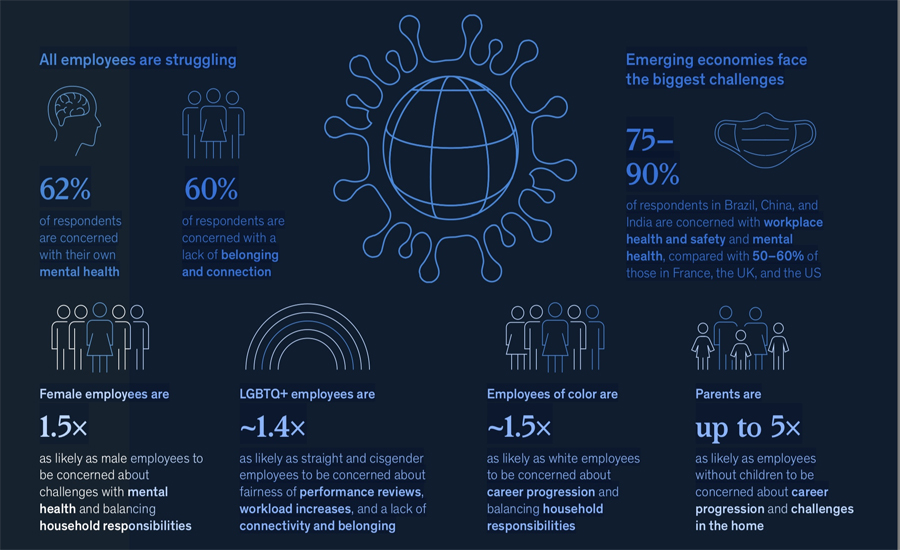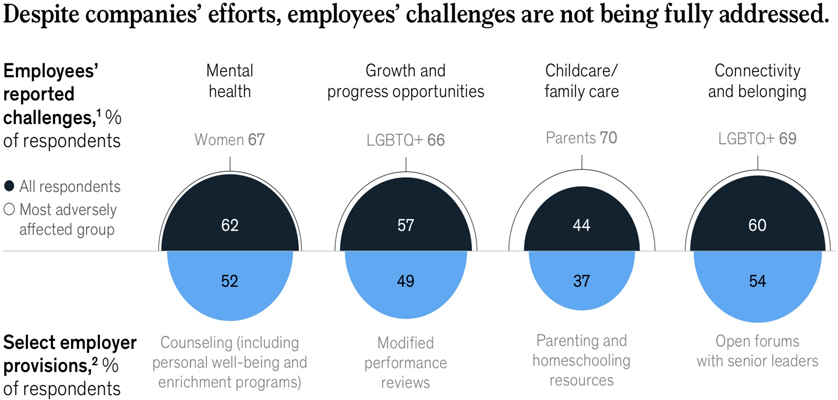Diverse staff are struggling the most in the pandemic and need more targeted support from their employers, according to the latest McKinsey study.
Diverse groups, including women, LGBTQ+ employees, people of colour, as well as working parents have been hit the hardest, particularly with balancing work and home life as more staff now work remotely where possible, reveals the study. The main challenges that diverse staff are grappling are related to mental health, work–life balance, workplace health and safety, a missing connectivity and belonging with colleagues, as well as concerns about job security, opportunities, according to McKinsey’s latest study.
According to the study, 67% women report mental health challenges, 70% parents say they are struggling with family and childcare responsibility, and 66% LGBTQ+ staff cite challenges related to connectivity and belonging. In fact, the study reveals that just one in six diverse employees feels more supported during Covid-19 than they did before the crisis.
Although companies have responded by providing some solutions, the McKinsey study found that their efforts have not gone far enough to address the challenges. As a result, diverse employees and working parents are still struggling to cope with the wide range of pandemic challenges that go beyond remote working.

SLOW DIVERSITY PROGRESS
Slow diversity progress hasn’t helped deal with mental health and wellbeing challenges, according to the study. Diversity has been slow with the majority of companies still struggling to execute their diversity, equity and inclusion (DE&I) strategies. The main challenges include a lack of employee awareness of programmes (26%), financial incentives not aligned with DE&I goals (25%), insufficient leadership role models (25%), rewards and recognition not being aligned with DE&I (23%), and being stretched too thinly (23%).
This disconnect has consequences particularly for diverse employees. As a result, only one in six diverse employees feels more supported amid the pandemic than before the crisis. In certain parts of the world this figure is much lower. For example, only 5% of women in China and 9% of those in India reported feeling more supported by their employers during Covid-19, compared to 22-29% of women in Brazil, France, Germany, Ireland, and the United Kingdom.

MENTAL HEALTH & WELLBEING CHALLENGES
As a result, significant gaps and DE&I challenges remain, particularly with providing adequate mental health and wellbeing support, noted the study. For example, it found that the number of companies responding to mental-health challenges, remains well below the share of workers reporting it, with diverse populations feeling the gap the most.
According to the report, 44% of companies have implemented personal wellbeing and enrichment programmes, and 52% offer mental-health/bereavement counselling. However, 62% of companies said that mental-health issues remains a challenge, particularly for diverse groups.
This is proving to be a challenge because of the varying diverse needs of different employee groups. For example, the report found that women are more appreciative of mental-health/bereavement counselling and well-being resources offered by their companies compared to men, because they are more likely to report mental-health issues. Around 35% of women rank counselling among the top three most important resources that their employers could provide during the Covid-19 crisis, compared to 29% of men.
LBGTQ+ employees also appreciate health checks/services more than straight and cisgender employees. LGBTQ+ employees are also more likely to value increased time off (both paid and unpaid) than their straight peers. Perhaps because of their concerns about career progression, they also value job training/reskilling more (32% compared with 25% of straight and cisgender employees), noted the report.

KEY RECOMMENDATIONS
Although there is no magic-bullet solution, the research recommends that companies invest more in mental health and wellbeing programmes, and provide interventions related to increased workloads and employees’ sense of belonging to lower the risk of staff burnout. Leaders must “commit to building a more equitable and inclusive workplace to ensure a positive recovery for all”, noted the study.
So what steps can organisations take to provide adequate support for struggling staff? Companies need to find ways to address new challenges that disproportionately impact underrepresented and diverse groups through targeted support. The McKinsey study recommends:
Sharpening your DE&I priorities
Putting DE&I on the agenda and ensuring there is an empowered leader running the effort is a start, but businesses must dedicate resources – for example, budget and staff – accordingly. Setting and tracking clear aspirations (which only 50% of surveyed companies do) will also help to quantify progress even when there are competing attentions. They must find ways to address some of the challenges identified in our survey, including misalignment of financial incentives and a lack of accountability of senior leaders.
Resist business as usual
The report identified 33 core interventions to drive impact, 10 of which are particularly relevant in the Covid-19 context. Companies need to focus on a few specific interventions that are relevant for this moment for their context, and then actually move the needle in their organisation with disciplined execution.
Tackle new challenges
The imperative for mental health is clear across all employee groups, but particularly for women and LGBTQ+ employees. Companies need to think through the implications for their workforce and the role they can best play to support their employees. This could take many forms, ranging from provision of healthcare services and counselling support to manager training. Steps employers take to tackle other challenges, for example, those related to workload increases or office connectivity, can also play a role.
Rethink flexibility and boundaries
LGBTQ+ employees and people of colour/from minority communities, in particular, cited concerns with workload increases, and more workers expect this to be a challenge in the next six months. Addressing this may require companies to rethink expectations on worker productivity and performance, expand benefits like paid time off, and support employees in establishing boundaries between work and home life.
Extend leadership beyond your company walls
The survey found that employees across countries expect businesses to have an external voice on DE&I, ranging from committing to community and philanthropic endeavors to engaging with suppliers. This suggests companies will benefit from additional strategic attention on how to pull these external levers. Companies should examine their own aspirations, including how best to align their internal goals with a broader role in advancing DE&I.
For more information about the report, click here.
With the rise in Covid-19 cases, tightening restrictions and accompanying schools closures across Europe and the US, more working parents are at breaking point and at high risk of burnout as they juggle work and parenting demands. Click here to read more.







































